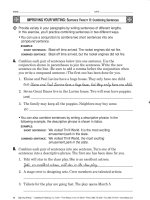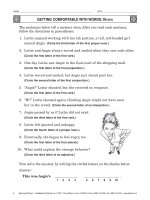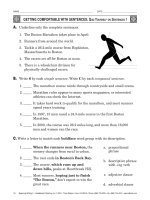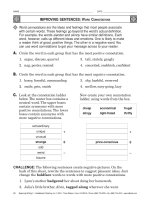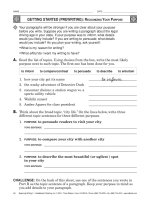Tài liệu Beginning writing 2 part 11 doc
Bạn đang xem bản rút gọn của tài liệu. Xem và tải ngay bản đầy đủ của tài liệu tại đây (131.04 KB, 13 trang )
88
Beginning Writing 2
• Saddleback Publishing, Inc. © 2001 • Three Watson, Irvine, CA 92618 • Phone: (888) 735-2225 • Fax: (888) 734-4010 • www.sdlback.com
NAME DATE
SPELLING: P
OSSESSIVES
Nouns that show ownership are called
possessives.
Different kinds of
nouns are made possessive in the following ways:
•To singular nouns, add an apostrophe (’) and an
s
.
EXAMPLE:
the cat’s collar
•To plural nouns ending in
s
, add only an apostrophe.
EXAMPLE:
the students’ lunchboxes
•To plural nouns that do not end in
s
, add an
apostrophe and an
s.
EXAMPLE:
the geese’s flight path
•To a singular noun that ends in
s
, add only an
apostrophe or add an apostrophe
s
.
EXAMPLES:
Charles’s suitcase
or
Charles’ suitcase
To complete each sentence, circle the correct possessive form.
1. The black widow is one of the ( worlds’ / world’s ) most
dangerous spiders.
2. A female ( spider’s / spiders’ ) bite can be deadly!
3. A ( house’s / houses’ ) dark nooks and crannies make perfect
homes for black widows.
4. The ( Martins / Martins’ ) house had a black widow nest.
5. It was in their ( children’s / childrens’ ) playroom.
6. Luckily, their ( mother’s / mothers’ ) watchful eye spied the nest.
7. Mrs. Martin called Mike ( Jone’s / Jones’s ) Pest Control Service.
8. Mr. Jones checked each ( room’s / rooms’ ) closet for spiders.
CHALLENGE:
On the back of this sheet, rewrite each sentence, adding a noun
that shows ownership.
1. The ____________________ face was red from the cold.
2. My ____________________ temper is quick to rise.
3. The ____________________ tires were flat.
Saddleback Publishing, Inc. © 2001 • Three Watson, Irvine, CA 92618 • Phone: (888) 735-2225 • Fax: (888) 734-4010 • www.sdlback.com •
Beginning Writing 2
89
NAME DATE
SPELLING: S
AME
S
OUND
/D
IFFERENT
M
EANING
Watch out for
homonyms
. These are words that
sound the same, but are spelled differently and have
different meanings. Writers must be sure to write
the word that fits the meaning of their sentence.
EXAMPLE:
HOMONYMS
: bear
/
bare
The
bear
caught fish in the river.
In wintertime, the trees are
bare
of leaves.
A.
Circle the correct homonym in each pair. Use a dictionary if you need help.
1. The Titanic set ( sail
/
sale ) from England in April 1912.
2. “Do you ( need
/
knead ) any help?” asked the sales clerk.
3. The bride walked down the ( isle
/
aisle ) toward the ( alter
/
altar).
4. A ( colonel
/
kernel ) of popcorn stuck in my tooth.
B.
Write the correct homonym on each line. The first one has been done for you.
1. wave / waive
a. Try not to cry when you _______________ goodbye.
b. If you promise to drive carefully, we will _______________ the fine.
2. stationery / stationary
a. Phil runs a mobile repair shop, but Dan’s shop is __________________.
b. Elsie mailed a letter written on blue ____________________.
3. rain / reign
a. The ___________________ of Czar Ivan was a terrible time for Russia.
b. After 20 days of wind and ___________________, the sun came out.
4. fourth / forth
a. “Go ______________ and slay the dragon!” the king ordered his knight.
b. Dennis had failed the driving test three times, but he passed on his
______________ try.
CHALLENGE:
Careless writers often misuse these common homonyms:
its
/
it’s their
/
they’re
/
there your
/
you’re two
/
to
/
too
On the back of this sheet, write 10 original sentences. Use one of the
above homonyms in each sentence.
wave
waive
90
Beginning Writing 2
• Saddleback Publishing, Inc. © 2001 • Three Watson, Irvine, CA 92618 • Phone: (888) 735-2225 • Fax: (888) 734-4010 • www.sdlback.com
NAME DATE
SPELLING: C
APITALIZATION
I
Use a capital letter to:
•begin the first word of a sentence.
EXAMPLE:
Our dog has fleas.
•begin the name of a person, place, day, month, or holiday.
EXAMPLES:
On Tuesday, Margo bought tickets to go to Disneyland
on her Thanksgiving break next November.
•begin a person’s title and the names of geographical regions, organizations,
or businesses.
EXAMPLES:
Last month Governor O’Donnell toured the South and spoke
to the Mississippi Association of Women Voters.
•begin the first word and all main words in the title of a book, story, song, etc.
EXAMPLES:
In only one day, I read an entire book,
Amazing People
, and
a short story, “An Amazing Tale,” and composed a song about
myself, “Oh, How Amazing I Am!”
Read the following tale. Notice that the boldface words have been
numbered. On the back of this sheet, rewrite the numbered words and
explain why they are capitalized. The first one has been done for you.
The (1)Tale of Febold Feboldson
Back in the 1800s, a fellow named (2)Febold Feboldson left
(3)Sweden. (4)He came to America and settled in Nebraska. Before long,
Febold heard that gold had been discovered in California. Soon mobs of
gold-seekers were headed for the (5)West.
In the winter of 1849, a terrible snowstorm blew in. Gold-rushers
passing through Nebraska were freezing cold. Suddenly Febold had his
own idea for making money. He got a wagon and some oxen and headed
for the hottest place he knew of—(6)Death Valley, California. There he
loaded his wagon with burning sand and drove back to the Midwest.
Febold painted a sign on his wagon. (7)“Traveler’s Friend Warming
Company,” the letters read. “Get your hot sand here!” Febold shouted
to the travelers. Before the end of (8)December, Febold had sold
every grain. Not only was Febold wealthy, but on (9)Valentine’s Day
(10)President Zachary Taylor named him Nebraska’s man of the year!
1. _____________________________________________________________________
Tale – capitalized because it is part of the story title.
Saddleback Publishing, Inc. © 2001 • Three Watson, Irvine, CA 92618 • Phone: (888) 735-2225 • Fax: (888) 734-4010 • www.sdlback.com •
Beginning Writing 2
91
NAME DATE
SPELLING: C
APITALIZATION
II: P
ROPER
A
DJECTIVES
Proper adjectives
are descriptive words formed from proper nouns.
EXAMPLE:
The president stood before the American flag.
That vase is a beautiful example of Chinese art.
A proper adjective is always capitalized. The noun that follows
it is not capitalized unless it is a proper noun.
EXAMPLE:
The children will gather Easter eggs on Easter Sunday.
A.
Underline the proper adjective in each sentence.
1. I’ve found that Sparkle toothpaste whitens my teeth.
2. The neighbors just bought a Ford convertible.
3. The original Shakespearean plays had all-male casts.
4. Trinity Church just hired a new Lutheran minister.
5. The Jewish synagogue on Elm Street has a large congregation.
6. Professor Scott teaches Russian history and English.
7. I think that British people have an interesting accent.
8. Gasoline prices are lower at the Regal station in Carson City.
9. We celebrate Veterans’ Day to honor World War II veterans.
10. Poor old Tommy Turkey didn’t want to become a Thanksgiving dinner.
B.
Write six original sentences. Use each word in the box as a proper adjective.
American Buddhist Toyota Halloween Japanese Kleenex
1. _____________________________________________________________________
_____________________________________________________________________
2. _____________________________________________________________________
_____________________________________________________________________
3. _____________________________________________________________________
_____________________________________________________________________
4. _____________________________________________________________________
_____________________________________________________________________
5. _____________________________________________________________________
_____________________________________________________________________
6. _____________________________________________________________________
_____________________________________________________________________
92
Beginning Writing 2
• Saddleback Publishing, Inc. © 2001 • Three Watson, Irvine, CA 92618 • Phone: (888) 735-2225 • Fax: (888) 734-4010 • www.sdlback.com
NAME DATE
DOWN
1. To make gravy, the chef stirred a
mixchure of flour and broth.
2. To many cooks can spoil the soup.
4. Don’t cut off you’re nose to spite
your face!
5. It is better to give than to recieve.
7. Time is a terribel thing to waste.
8. I wish I had a
nickle to buy a pickle!
11. “That was the last straw!”
she exclamed.
13. Abe Lincoln described a
goverment “of the people, by
the people, and for the people.”
15. The son was hiding behind a
dark cloud.
SPELLING: R
EVIEW
P
UZZLE
First find and circle the misspelled word in each clue. Then use the correct
spelling of each word to solve the crossword puzzle.
ACROSS
3. In 1721, the most
common English
words were first
defined in a dictionery.
6. Shall we cook at home
or go out to a restrant?
9. The gooses flew south in
a V-shaped formation.
10. Fakt is often stranger
than fiction.
12. The two lines met at
a 90-degree angel.
14. “All dogs must be on
leashs,” said the park sign.
16. That cheater is as
slippery as an ele.
17. We headed for the store
with money burning a
hole in hour pockets.
18. The judge tried to
seperate the truth
from the lies.
19. The best-laid plans of
mice and mans often
go wrong.
20. A leopard doesn’t change it’s spots!
MT
DY
R
RT N
GF
E
AG
LS
E
O
SM
I
1
6
5
4
3
2
12
11
10
9
8
7
13
14 15
16
17
18
19
20
